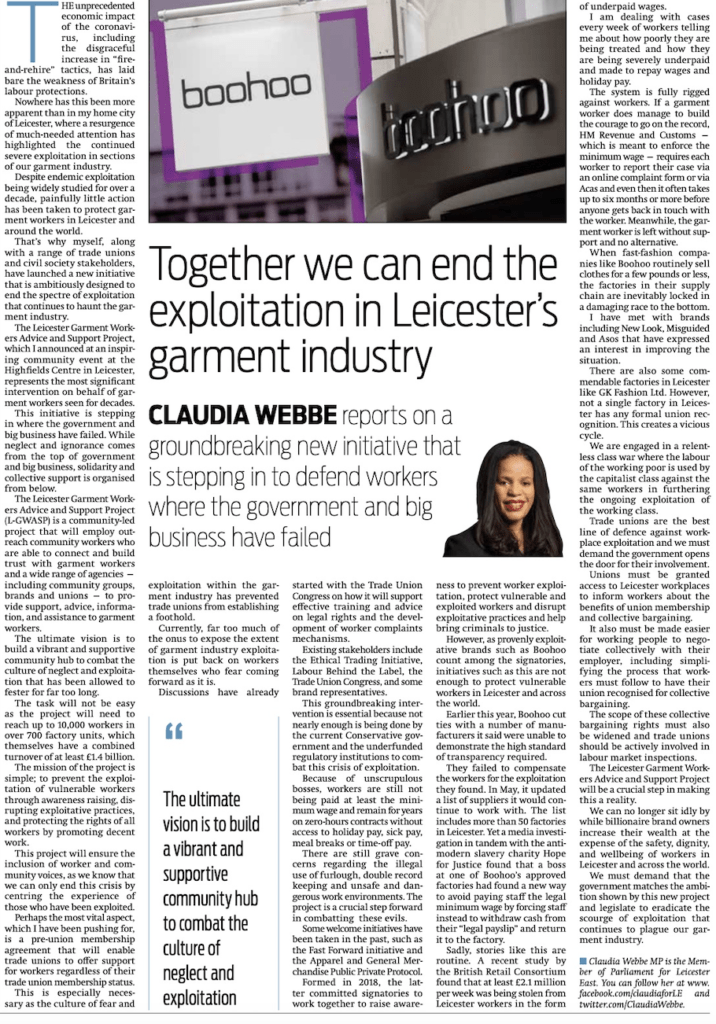
Together we can end the exploitation in Leicester’s garment industry
By Claudia Webbe MP
CLAUDIA WEBBE reports on a groundbreaking new initiative that is stepping in to defend workers where the government and big business have failed
THE unprecedented economic impact of the coronavirus, including the disgraceful increase in “fire-and-rehire” tactics, has laid bare the weakness of Britain’s labour protections.
Nowhere has this been more apparent than in my home city of Leicester, where a resurgence of much-needed attention has highlighted the continued severe exploitation in sections of our garment industry.
Despite endemic exploitation being widely studied for over a decade, painfully little action has been taken to protect garment workers in Leicester and around the world.
That’s why myself, along with a range of trade unions and civil society stakeholders, have launched a new initiative that is ambitiously designed to end the spectre of exploitation that continues to haunt the garment industry.
The Leicester Garment Workers Advice and Support Project, which I announced at an inspiring community event at the Highfields Centre in Leicester, represents the most significant intervention on behalf of garment workers seen for decades.
This initiative is stepping in where the government and big business have failed. While neglect and ignorance comes from the top of government and big business, solidarity and collective support is organised from below.
The Leicester Garment Workers Advice and Support Project (L-GWASP) is a community-led project that will employ outreach community workers who are able to connect and build trust with garment workers and a wide range of agencies — including community groups, brands and unions — to provide support, advice, information, and assistance to garment workers.
The ultimate vision is to build a vibrant and supportive community hub to combat the culture of neglect and exploitation that has been allowed to fester for far too long.
The task will not be easy as the project will need to reach up to 10,000 workers in over 700 factory units, which themselves have a combined turnover of at least £1.4 billion.
The mission of the project is simple; to prevent the exploitation of vulnerable workers through awareness raising, disrupting exploitative practices, and protecting the rights of all workers by promoting decent work.
This project will ensure the inclusion of worker and community voices, as we know that we can only end this crisis by centring the experience of those who have been exploited.
Perhaps the most vital aspect, which I have been pushing for, is a pre-union membership agreement that will enable trade unions to offer support for workers regardless of their trade union membership status.
This is especially necessary as the culture of fear and exploitation within the garment industry has prevented trade unions from establishing a foothold.
Currently, far too much of the onus to expose the extent of garment industry exploitation is put back on workers themselves who fear coming forward as it is.
Discussions have already started with the Trade Union Congress on how it will support effective training and advice on legal rights and the development of worker complaints mechanisms.
Existing stakeholders include the Ethical Trading Initiative, Labour Behind the Label, the Trade Union Congress, and some brand representatives.
This groundbreaking intervention is essential because not nearly enough is being done by the current Conservative government and the underfunded regulatory institutions to combat this crisis of exploitation.
Because of unscrupulous bosses, workers are still not being paid at least the minimum wage and remain for years on zero-hours contracts without access to holiday pay, sick pay, meal breaks or time-off pay.
There are still grave concerns regarding the illegal use of furlough, double record keeping and unsafe and dangerous work environments. The project is a crucial step forward in combatting these evils.
Some welcome initiatives have been taken in the past, such as the Fast Forward initiative and the Apparel and General Merchandise Public Private Protocol.
Formed in 2018, the latter committed signatories to work together to raise awareness to prevent worker exploitation, protect vulnerable and exploited workers and disrupt exploitative practices and help bring criminals to justice.
However, as provenly exploitative brands such as Boohoo count among the signatories, initiatives such as this are not enough to protect vulnerable workers in Leicester and across the world.
Earlier this year, Boohoo cut ties with a number of manufacturers it said were unable to demonstrate the high standard of transparency required.
They failed to compensate the workers for the exploitation they found. In May, it updated a list of suppliers it would continue to work with. The list includes more than 50 factories in Leicester. Yet a media investigation in tandem with the anti-modern slavery charity Hope for Justice found that a boss at one of Boohoo’s approved factories had found a new way to avoid paying staff the legal minimum wage by forcing staff instead to withdraw cash from their “legal payslip” and return it to the factory.
Sadly, stories like this are routine. A recent study by the British Retail Consortium found that at least £2.1 million per week was being stolen from Leicester workers in the form of underpaid wages.
I am dealing with cases every week of workers telling me about how poorly they are being treated and how they are being severely underpaid and made to repay wages and holiday pay.
The system is fully rigged against workers. If a garment worker does manage to build the courage to go on the record, HM Revenue and Customs — which is meant to enforce the minimum wage — requires each worker to report their case via an online complaint form or via Acas and even then it often takes up to six months or more before anyone gets back in touch with the worker. Meanwhile, the garment worker is left without support and no alternative.
When fast-fashion companies like Boohoo routinely sell clothes for a few pounds or less, the factories in their supply chain are inevitably locked in a damaging race to the bottom.
I have met with brands including New Look, Misguided and Asos that have expressed an interest in improving the situation.
There are also some commendable factories in Leicester like GK Fashion Ltd. However, not a single factory in Leicester has any formal union recognition. This creates a vicious cycle.
We are engaged in a relentless class war where the labour of the working poor is used by the capitalist class against the same workers in furthering the ongoing exploitation of the working class.
Trade unions are the best line of defence against workplace exploitation and we must demand the government opens the door for their involvement.
Unions must be granted access to Leicester workplaces to inform workers about the benefits of union membership and collective bargaining.
It also must be made easier for working people to negotiate collectively with their employer, including simplifying the process that workers must follow to have their union recognised for collective bargaining.
The scope of these collective bargaining rights must also be widened and trade unions should be actively involved in labour market inspections.
The Leicester Garment Workers Advice and Support Project will be a crucial step in making this a reality.
We can no longer sit idly by while billionaire brand owners increase their wealth at the expense of the safety, dignity, and wellbeing of workers in Leicester and across the world.
We must demand that the government matches the ambition shown by this new project and legislate to eradicate the scourge of exploitation that continues to plague our garment industry.
Claudia Webbe MP is the member of Parliament for Leicester East. You can follow her at www.facebook.com/claudiaforLE and twitter.com/ClaudiaWebbe


